中考英语总复习-形容词与副词精讲
- 格式:doc
- 大小:149.56 KB
- 文档页数:8

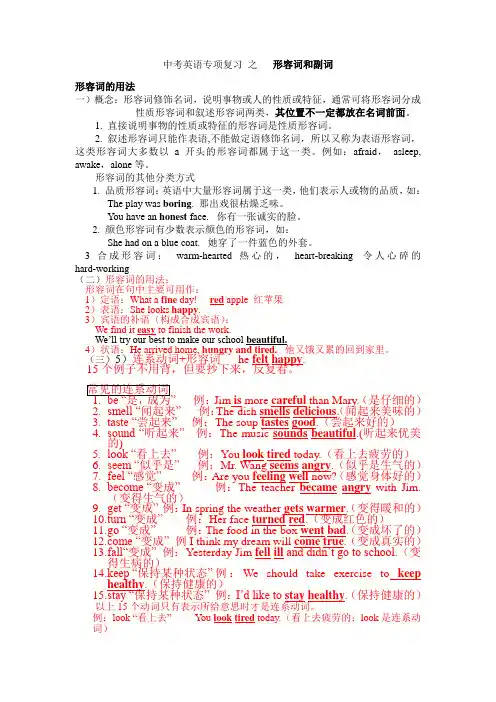
中考英语专项复习之形容词和副词形容词的用法一)概念:形容词修饰名词,说明事物或人的性质或特征,通常可将形容词分成性质形容词和叙述形容词两类,其位置不一定都放在名词前面。
1. 直接说明事物的性质或特征的形容词是性质形容词。
2. 叙述形容词只能作表语,不能做定语修饰名词,所以又称为表语形容词,这类形容词大多数以a开头的形容词都属于这一类。
例如:afraid,asleep, awake,alone等。
形容词的其他分类方式1. 品质形容词:英语中大量形容词属于这一类,他们表示人或物的品质,如:The play was boring. 那出戏很枯燥乏味。
You have an honest face. 你有一张诚实的脸。
2. 颜色形容词有少数表示颜色的形容词,如:She had on a blue coat. 她穿了一件蓝色的外套。
3 合成形容词:warm-hearted 热心的,heart-breaking 令人心碎的hard-working(二)形容词的用法:形容词在句中主要可用作:1)定语:What a fine day! red apple 红苹果2)表语:She looks happy.3)宾语的补语(构成合成宾语):We find it easy to finish the work.We’ll try our best to make our school beautiful.4)状语:He arrived home, hungry and tired.他又饿又累的回到家里。
(三)5)连系动词+形容词he felt happy.15个例子不用背,但要抄下来,反复看。
例:Jim is more careful than Mary.(是仔细的)2.smell “闻起来”例:The dish smells delicious.(闻起来美味的)3.taste “尝起来”例:The soup tastes good.(尝起来好的)4.sound “听起来”例:The music sounds beautiful.(听起来优美的)5.look “看上去”例:You look tired today.(看上去疲劳的)6.seem “似乎是”例:Mr. Wang seems angry.(似乎是生气的)7.feel “感觉”例:Are you feeling well now?(感觉身体好的)8.become “变成”例:The teacher became angry with Jim.(变得生气的)9.get “变成”例:In spring the weather gets warmer.(变得暖和的)10.t urn “变成”例:Her face turned red.(变成红色的)11.g o “变成” 例:The food in the box went bad.(变成坏了的)12.c ome “变成”例I think my dream will come true.(变成真实的)13.f all“变成”例:Yesterday Jim fell ill and didn’t go to school.(变得生病的)14.k eep “保持某种状态”例:We should take exercise to keephealthy.(保持健康的)15.s tay “保持某种状态”例:I’d like to stay healthy.(保持健康的)以上15个动词只有表示所给意思时才是连系动词。
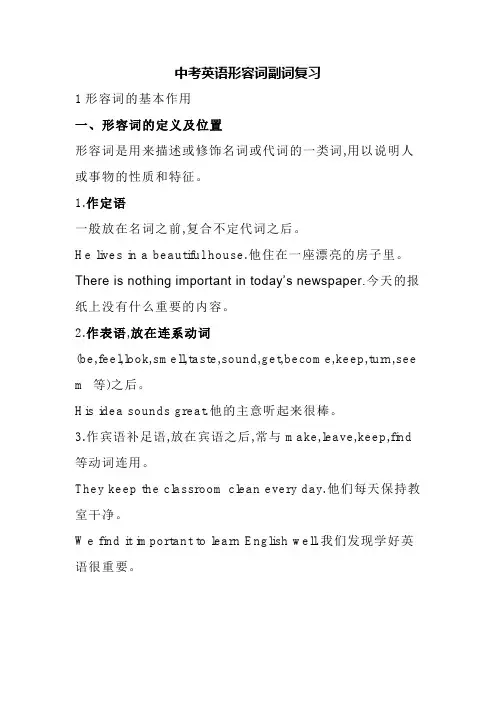
中考英语形容词副词复习1形容词的基本作用一、形容词的定义及位置形容词是用来描述或修饰名词或代词的一类词,用以说明人或事物的性质和特征。
1.作定语一般放在名词之前,复合不定代词之后。
He lives in a beautiful house.他住在一座漂亮的房子里。
There is nothing important in today’s newspaper.今天的报纸上没有什么重要的内容。
2.作表语,放在连系动词(be,feel,look,smell,taste,sound,get,become,keep,turn,see m 等)之后。
His idea sounds great.他的主意听起来很棒。
3.作宾语补足语,放在宾语之后,常与make,leave,keep,find 等动词连用。
They keep the classroom clean every day.他们每天保持教室干净。
We find it important to learn English well.我们发现学好英语很重要。
4.形容词的名词化有些形容词放在定冠词之后变成名词,表示一类人,常见的有:good/bad,rich/poor,young/old,deaf/blind,black/white,livi ng/dead等The old should be taken good care of.老年人应该受到很好的照顾。
2形容词词义辨析中考主要在完形中考查形容词词义辨析。
学生在做辨析题时,首先应读懂句意,抓住题干中关键信息,并分析各选项表达的意思,结合日常生活的常识及语境即可选出正确答案。
如:After the football match, the players were very ______ and tired.A. cool B. full C. lively D. thirsty方法点拨第1步:分析四个选项均为形容词,在句中作表语;第2步:分析语境“在足球比赛之后,运动员是_____和疲劳的。
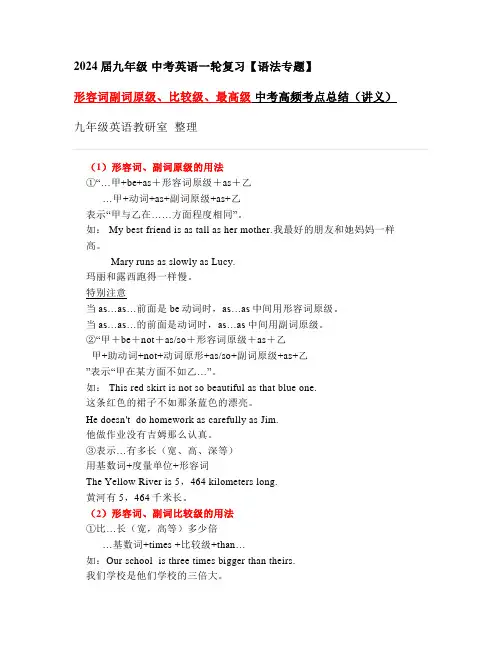
2024届九年级中考英语一轮复习【语法专题】形容词副词原级、比较级、最高级中考高频考点总结(讲义)九年级英语教研室整理(1)形容词、副词原级的用法①“…甲+be+as+形容词原级+as+乙…甲+动词+as+副词原级+as+乙表示“甲与乙在……方面程度相同”。
如: My best friend is as tall as her mother.我最好的朋友和她妈妈一样高。
Mary runs as slowly as Lucy.玛丽和露西跑得一样慢。
特别注意当as…as…前面是be动词时,as…as中间用形容词原级。
当as…as…的前面是动词时,as…as中间用副词原级。
②“甲+be+not+as/so+形容词原级+as+乙甲+助动词+not+动词原形+as/so+副词原级+as+乙”表示“甲在某方面不如乙…”。
如: This red skirt is not so beautiful as that blue one.这条红色的裙子不如那条蓝色的漂亮。
He doesn't do homework as carefully as Jim.他做作业没有吉姆那么认真。
③表示…有多长(宽、高、深等)用基数词+度量单位+形容词The Yellow River is 5,464 kilometers long.黄河有5,464千米长。
(2)形容词、副词比较级的用法①比…长(宽,高等)多少倍…基数词+times +比较级+than…如:Our school is three times bigger than theirs.我们学校是他们学校的三倍大。
是…的几倍…基数词+times as+形容词或副词原级+as…如:Our school is three times as big as theirs.我们学校是他们学校的三倍大。
②用原级形式表示比较级意思。
“甲+be+not+as/so+形容词原级+as+乙”表示“甲在某方面不如乙…”。

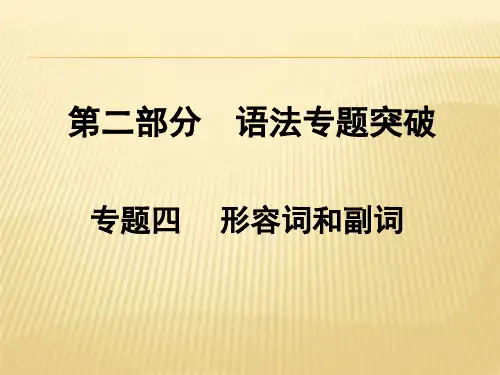
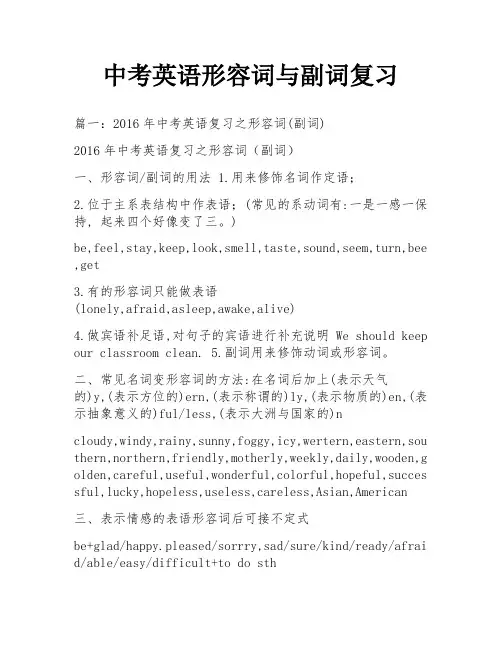
中考英语形容词与副词复习篇一:2016年中考英语复习之形容词(副词)2016年中考英语复习之形容词(副词)一、形容词/副词的用法 1.用来修饰名词作定语;2.位于主系表结构中作表语;(常见的系动词有:一是一感一保持, 起来四个好像变了三。
)be,feel,stay,keep,look,smell,taste,sound,seem,turn,bee ,get3.有的形容词只能做表语(lonely,afraid,asleep,awake,alive)4.做宾语补足语,对句子的宾语进行补充说明 We should keep our classroom clean.5.副词用来修饰动词或形容词。
二、常见名词变形容词的方法:在名词后加上(表示天气的)y,(表示方位的)ern,(表示称谓的)ly,(表示物质的)en,(表示抽象意义的)ful/less,(表示大洲与国家的)ncloudy,windy,rainy,sunny,foggy,icy,wertern,eastern,sou thern,northern,friendly,motherly,weekly,daily,wooden,g olden,careful,useful,wonderful,colorful,hopeful,succes sful,lucky,hopeless,useless,careless,Asian,American三、表示情感的表语形容词后可接不定式be+glad/happy.pleased/sorrry,sad/sure/kind/ready/afrai d/able/easy/difficult+to do sth四、形容词(副词)比较级、最高级的构成(一)以er,ow,ble,ple,y结尾的双音节词和单音节词:①一般在词尾直接加er或est; ②以不发音的e结尾的, 在词尾加r 或st;③以“辅音字母+y”结尾,先把y变为i,再加er或est; ④.以重读闭音节结尾,且末尾只有一个辅音字母的,双写末尾的辅音字母,再加er/est.fat,thin,sad,hot,big,red,wet.(二)末尾不是以er,ow,ble,ple,y结尾的双音节词和所有多音节词直接在单词前加more/most; (三)以-ly结尾的副词和以-ing/-ed结尾的形容词直接在单词前加more/most; (四)不规则变化(good/well,many/much,bad/badly/ill,little,far,old)good/well-better-best many/much-more/most little-less-leastbad/badly/ill-worse-worst far-farther/further-farthest/furthest old-older/elder-oldest/eldest五、形容词/副词原级的用法1.可以用quite,very,so,too,enough修饰原级;2. as+原级+as3. not+as/so+原级+as4.甲是乙的几倍(甲+is+倍数+as…as+乙)This bridge is three times as long as that one. Your room is twice as large as mine.六、形容词/副词比较级的用法 1.than是比较级的标志词2.句中出现两个比较对象或含两个人/物时,用比较级;3. much,far,even,a little,a lot,a bit常用于比较级之前;4.Which/Who+比较级,A or B?5.甲+be+the+比较级+of the two(甲是两者中较…的)6.甲+be+比较级+than+any other+单数名词(甲比其它的任何一个都…)7.倍数+比较级+than(表示几倍于) This classroom is two times bigger than that one. 8.比较级+and+比较级(越来越…)a.单音节词和以er,ow,ble,ple,y结尾的双音节词:比较级+and+比较级 b.部分双音节词和多音节词:more and more+多音节词原形 9.the+比较级……,the+比较级……(越……,就越……)七、形容词/副词最高级的用法 1.the 是最高级的标志词;2.句中出现≥3个比较对象时,用最高级;3.句中出现of all,of the three,that I have ever seen 时,用最高级;4.Which/Who+is+the+最高级,甲、乙or 丙?5.表示最……之一,要用“one of+the+形容词最高级+复数名词+表示范围的介词短语”6.序数词后的形容词一般要用最高级(表示第几最……) The Yello w River is the second longest river in China.7.形容词最高级前一般要加the,但若最高级前出现了形容词性物主代词或名词所有格形式,则不再用the.8.副词最高级前一般不用定冠词the.翻译下列短语和句子:1.越来越胖2.越来越漂亮3.越来越热4.越来越无聊5.越来越瘦6.越来越高兴7.越来越生气8.越来越饿9.越来越伤心10.越来越冷 11.越来越大12.越来越粗心 13.越来越早 14.越来越多15.越来越好 16.越来越危险17.越来越少18.越来越疲惫19.你越认真,你犯的错误就越少。
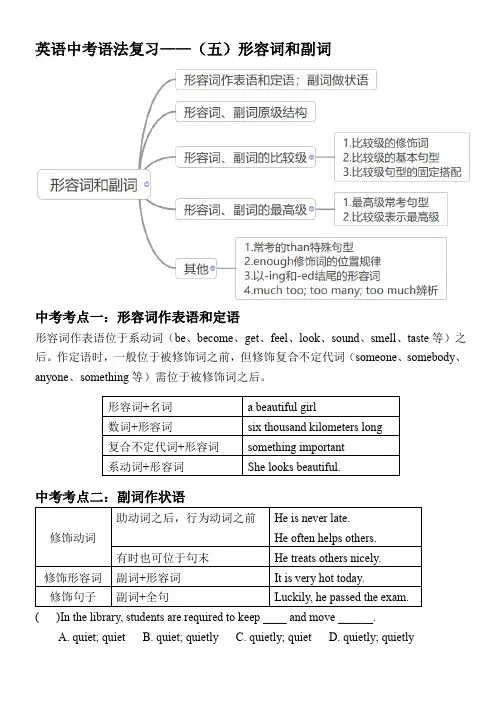
英语中考语法复习——(五)形容词和副词中考考点一:形容词作表语和定语形容词作表语位于系动词(be 、become 、get 、feel 、look 、sound 、smell 、taste 等)之后。
作定语时,一般位于被修饰词之前,但修饰复合不定代词(someone 、somebody 、anyone 、something 等)需位于被修饰词之后。
中考考点二:副词作状语修饰动词助动词之后,行为动词之前He is never late. He often helps others. 有时也可位于句末He treats others nicely. 修饰形容词 副词+形容词 It is very hot today. 修饰句子副词+全句Luckily, he passed the exam.( )In the library, students are required to keep ____ and move ______.A. quiet; quietB. quiet; quietlyC. quietly; quietD. quietly; quietly形容词+名词 a beautiful girl数词+形容词 six thousand kilometers long 复合不定代词+形容词 something important 系动词+形容词She looks beautiful.中考考点三:形容词、副词的原级( )1. —What do you think of English?—I think English is as _____ as Chinese.A. usefulB. more usefulC. the most useful( )2.Wang Wei speaks English as ____as Yang Lan. They both study English hard.A. goodB. wellC. betterD. best中考考点三:形容词、副词的比较级和最高级的构成A.规则变化B.不规则变化中考考点五:形容词、副词的比较级用法A.常见的修饰形容词比较级的词a little; a bit; a little bit; even; much; far; rather( )1.--It's raining heavily. —The radio says it will be ____ worse tomorrow.A. veryB. quiteC. tooD. much( )2. —How are you today, Tom? —I'm even_______.A. worseB. badlyC. betterD. wellB. 形容词、副词常考点( )1.Study hard! ______ you study, ______ results you'll get.A. Harder; betterB. The harder; better.C. The harder; the betterD. Harder; the better.( )2. Our country is getting _______.A. more and more strongB. strong and strongC. stronger中考考点六:形容词、副词的最高级A.常考句型:the+最高级+of/in…( )1. The hotel is very old. It's one of ______ buildings in the city. [北京卷]A. oldB. olderC. oldestD. the oldest( )2. China is developing ________ of all the countries in the world.[潍坊卷]A. fastB. fasterC. fastestD. the most fastB.比较级表示最高级·比较级+than+any other+可数名词单数=比较级+than+(all) the other+可数名词复数经典例句:1. He is taller than any other student of Class Three. 他比三班的其他同学都更高。
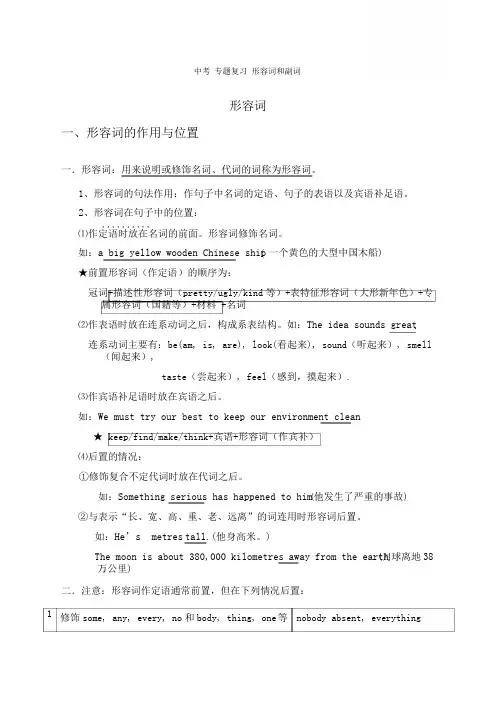
( .. .(.(月中考 专题复习 形容词和副词形容词一、形容词的作用与位置一.形容词:用来说明或修饰名词、代词的词称为形容词。
1、形容词的句法作用:作句子中名词的定语、句子的表语以及宾语补足语。
2、形容词在句子中的位置:..........⑴作定语时放在名词的前面。
形容词修饰名词。
如:a big yellow wooden Chinese ship 一个黄色的大型中国木船)★前置形容词(作定语)的顺序为:冠词+描述性形容词(pretty/ugly/kind 等)+表特征形容词(大形新年色)+专属形容词(国籍等)+材料 +名词⑵作表语时放在连系动词之后,构成系表结构。
如:The idea sounds great连系动词主要有:be(am, is, are), look(看起来), sound (听起来), smell(闻起来),taste (尝起来), feel (感到,摸起来).⑶作宾语补足语时放在宾语之后。
如:We must try our best to keep our environment clean★ keep/find/make/think+宾语+形容词(作宾补)⑷后置的情况:①修饰复合不定代词时放在代词之后。
如:Something serious has happened to him 他发生了严重的事故)②与表示“长、宽、高、重、老、远离”的词连用时形容词后置。
如:He’s metres tall .(他身高米。
)The moon is about 380,000 kilometres away from the earth 球离地 38 万公里)二.注意:形容词作定语通常前置,但在下列情况后置:1 修饰 some, any, every, no 和 body, thing, one 等 nobody absent, everything构成的复合不定代词时2以-able,-ible结尾的形容词可置于有最高级或only修饰的名词之后3alive,alike,awake,aware,asleep等可以后置4和空间、时间、单位连用时5成对的形容词可以后置6形容词短语一般后置possiblethe best book available,the only solution possiblethe only person awakea bridge50meters longa huge room simple and beautifula man difficult to get on with二、常见考点1.只能作表语的形容词:afraid害怕;alone独自的;asleep睡着的;awake醒着的;alive活着的;well健康的;ill病的;frightened害怕的例如,the man is ill.(正)the ill man is my uncle.(误)2.只能作定语的形容词:little小的;only唯一的;wooden木质的;woolen羊毛质的;elder年长的例如,my elder brother is in beijing.(正)my brother is elder.(误)3.貌似副词的形容词:lonely独自的;friendly友好的;lively生动的;lovely可爱的4.复合形容词:snow-white雪白的english-speaking说英语的;glass-topped玻璃罩的;full-time全日制的;well-known众所周知的;kind-hearted善良的;man-made人造的;take-away可以带走的;ten-year-old十岁的。
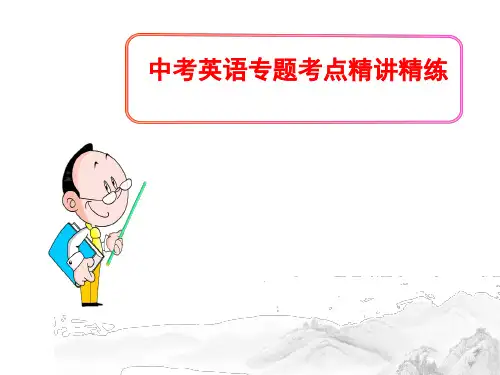
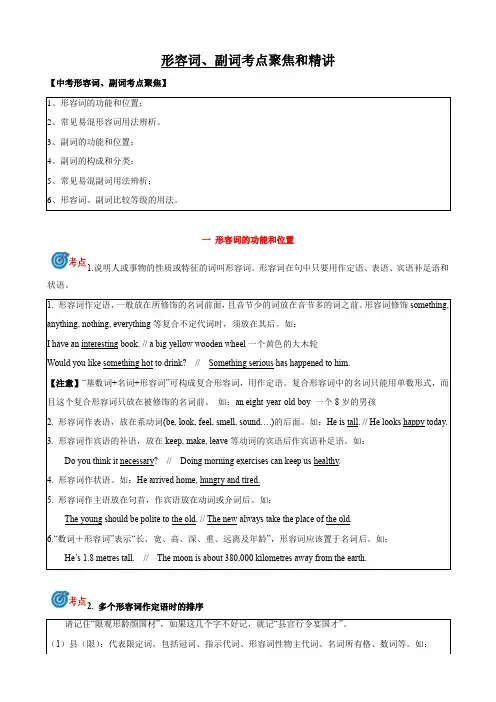
形容词、副词考点聚焦和精讲【中考形容词、副词考点聚焦】一形容词的功能和位置1.说明人或事物的性质或特征的词叫形容词。
形容词在句中只要用作定语、表语、宾语补足语和状语。
2. 多个形容词作定语时的排序There is a small old black wooden desk in my room. 在我的房间里有一个又小又旧的黑色木桌。
His living room is decorated with a large green Chinese carpet. 他的起居室里装饰着绿色的中国大地毯。
3. the加上某些形容词相当于名词,表示一类人或事物The poor are very happy, but the rich are sad. 穷人高兴,但是富人悲伤。
4. 以-ly结尾的形容词5. 只能作表语的形容词:6. 只能作定语的形容词:7. 既可做形容词又可做副词的词8. 形容词与名词的转换:(1)名词加后缀变为形容词。
(2)形容词加后缀变为名词。
9. -ing形容词和-ed形容词的比较:-ing形容词表示主动意义,多修饰事或物,多指事物影响到人,意为“使人(感到)……的”;而-ed 形容词往往带有被动含义,修饰人,多指人受到事物的影响,意为“感到……的”,常用于“sb.+ -ed形容词”结构,有时也做定语用。
10. 形容词常用句型:二常用易混形容词用法辨析:(1)whole与all的用法辨析:记住两个词序:① the whole +名词;①all (of) the +名词。
如:He was busy the whole morning.He can remember all the words he learns.(2)tall与high, short与low用法辨析:指人的个子时用tall与short;指其他事物时一般用high 与low。
He’s very tall/short. // A few people live on high mountains.Tall trees are standing on both sides of that avenue.(3)real与true的用法辨析:real一般指东西的真假,意为“真的”;而true则指事情或消息的可靠性,意为“真实的”。
形容词、副词用法专题精讲Ⅰ形容词一、形容词的一般用法1 .作定语,一般放在所修饰词的前面。
例如,It’sacoldandwindyday.2 .作表语,放在系动词的后面。
例如,Helooks happy today.3 .形容词修饰something,anything,nothing,everything等复合不定代词时,须放在其后。
例如,Wouldyoulikesomething hot to drink?4.表示长、宽、高、深及年龄的形容词,应放在相应的名词之后。
例如,Howlon g istheriver?Itsabouttwohundredmetreslong.5.只能作表语的形容词:afraid 害怕;alone单独的;asleep睡着的;awake醒着的;alive 活着的;frightened 害怕的例如,The man is ill.( 正) The ill man is my uncle.( 误)well 健康的;ill病的;只能作定语的形容词:little小的;only唯一的;wooden木质的;woolen羊毛质的;elder年长的例如,My elder brother isinBeijing.(正)Mybrother iselder.(误)7 .貌似副词的形容词:lonely单独的;friendly友好的;lively生动的;lovely可爱的8 .复合形容词:snow-white雪白的English-speaking说英语的;glass-topped玻璃罩的;full-time全日制的;well-known众所周知的;kind-hearted善良的;man-made人造的;take-away可以带走的;ten-year-old十岁的。
二、多个形容词修饰名词时,其顺序为:限定词(冠词、指示代词、形容词性物主代词、数词)——描绘词(大小,长短,形状,新旧,长幼,颜色)——出处——材料性质——类别——名词A small roundtable一张小圆桌Atallwhitebuilding一幢高大的白色建筑物A dirty old blackshirt一件又脏又旧的黑色衬衣AfamousAmerican medicalschool一个非常著名的美国医学院三、形容词常用句型“It’s+adj.+of+sb.+不定式〞表示“某人(做某事)怎么样〞。
形容词与副词三个级别的用法(1).没有东西相比,用原级;两者相比,用比较级;三者或以上相比,用最高级。
如:This story book is interesting(没比较,原级).This story book is more interesting than that one (两者比,比较级).This story book is the most interesting of the three books.(三者比,最高级)(2)三个级别的暗示词及句型。
原级:①.very, so, too, quite, rather + 原级The man is very (so, quite, rather) kind.It's too cold outside. Come in please.②.as + 原级as,not as (so) + 原级asHe is as tall as his brother.Lesson 1 is not as (so) difficult as Lesson 2. 第1 课不如第2课难。
③.原级+ enoughHe is not old enough to go to school.他不够年纪上学。
比较级:①.比较级+than Health is more important than wealth.健康比财富更重要。
This tree is taller than that one.④.far, much, a lot, a little, a bit, even, still + 比较级Li Jun is far(much, a lot) stronger than Li Ming.I am a little (a bit) younger than Lucy.⑤.比较级+比较级或“more and more +原级表示“越来越…工Our country is becoming stronger and stronger.我们国家正变得越来越强。
专题四形容词与副词一. 形容词:形容词主要用来修饰名词或代词,表示人或事物的性质、状态和特征的。
形容词在句中可用作表语、定语、补语等。
1作定语,放在名词前,something, anything, nothing, everything等复合不定代词之后;形容修饰疑问代词时,也须放在其后。
如:It’s a cold and windy day. Would you likesomething hot to drink?What else can you see? 你还能看见其它什么东西?2.作表语,放在系动词之后。
常见的系动词有be, become, get(变), turn(变), feel, look(看起来),seem, smell, sound, taste。
如:He looks happy today. Silk feels soft. 绸子摸起来很软。
Milk is able to turn bad easily in summer.3.作宾补,放在宾语之后★We are making our country strong.4.形容词的排列顺序:如:a big yellow Chinese wooden ship(一个黄色的大型中国木船)★前置形容词(作定语)的顺序为:限定描绘大长高,形状年龄和新老;颜色国籍跟材料,作用类别往后靠;①“限定词”包括:冠词、物主代词、指示代词、或数词等。
②表观点的“描绘”性形容词如:beautiful、bad、interesting、great等。
③“大长高”表示大小、长短、高低等一些词big,small, ,short, tall④表示“形状”的词如:round, square等。
⑤年龄,新旧,颜色的形容词young,old,new,white,red等⑥“国籍”指一个国家或地区的词。
Chinese,rural(乡村的)⑦“材料”的词如:wooden, woolen, stone,silk等。
形容词一、考点梳理考点一形容词的用法及位置1. 形容词的用法(1) 形容词是用来描述或修饰名词(或代词)的一类词。
形容词在句中作定语、表语、宾语补足语、状语、主语或宾语等成分。
Peter is tall. 彼得个子高。
(作表语)We must keep our classroom clean.我们必须保持我们的教室干净。
(作宾语补足语)She has short hair. 她留短发。
(作定语)The girl went to school, cold and hungry.那个女孩又冷又饿地去上学了。
(作状语)The rich should help the poor.富人应当帮助贫穷的人。
(作主语和宾语)(2) 多个形容词修饰一个名词时,其顺序为:限定词(冠词、指示代词等)+ 数词+ 描述性形容词+ 大小、长短、高低等形容词+ 形状+ 新旧+ 颜色+ 国籍+ 材料性质+ 用途类别。
巧记:多个形容词作定语的顺序口诀限定描述大长高,形状年龄与新老;颜色国籍出材料,用途类别往后靠。
a small round table 一张小圆桌a dirty old brown shirt一件又脏又旧的棕色衬衣(3) 某些形容词加上定冠词可以泛指一类人,谓语动词用复数,如:the dead, the living, the rich, the poor, the blind 等。
The poor are in great need of help.穷人们非常需要帮助。
(4) 有关国家和民族的形容词加上定冠词指这个民族的整体,谓语动词用复数,如:the British, the English, the French, the Chinese等。
The Chinese are hard-working.中国人是勤奋努力的。
2. 形容词的位置(1) 形容词作定语时一般放在被修饰词的前面。
I think it’s an interesting book.我觉得这是一本有趣的书。
形容词与副词一、考点解读中考对于形容词,副词的考查集中在原级、比较级和最高级的基本句型上,这是中考试题设置的重点所在。
近年来对形容词、副词词组的辨析成为考查形容词的又一种命题方式。
A.形容词1.形容词的基本功能及其在句子中的位置。
2.形容词的比较等级的构成。
3.形容词原级的用法。
4.形容词比较级的用法。
5.形容词的最高级的用法。
6.使用形容词时的易混知识。
B.副词1.副词的用法。
2.副词的位置。
3.副词的比较等级的构成及用法。
4.副词的易混知识。
5.形容词怎样变成副词。
二、专题梳理形容词用法(一)形容词的基本功能及其在句子中的位置说明人或事物的特征、性质或状态,常用来修饰名词或不定代词的词叫形容词。
1.形容词作定语,放在名词之前,不定代词之后。
e.g.The beautiful girl is my sister. 那个漂亮的女孩是我的妹妹。
I have something important to tell you. 我有重要的事情要告诉你。
2.作表语,放在系动词之后。
e.g.Our school is big and clean. 我们的学校又大又干净。
3.作宾语补足语,放在宾语之后。
e.g.You must keep your eyes closed. 你必须闭上眼睛。
I find it hard to travel around the big city. 我发现在这个大城市旅行很难。
4.某些形容词放在定冠词之后,变成名词,表示一类人。
常见词有good/bad,rich/poor,young/old,deaf/blind,black/white,living/dead等。
e.g.The rich should help the poor. 富人应该帮助穷人。
(二)形容词比较等级的构成:原级、比较级和最高级规则变化类别构成方法原级比较级最高级单音节词一般直接加-er,-est long longer longest和少数双音节词tall taller tallest 不发音的e结尾时加-r,-stlatelargelaterlargerlatestlargest 辅音字母加y结尾时把y变i,再加-er,-esteasyhappyeasierhappiereasiesthappiest 重读闭音节结尾并且只有一个辅音字母时,双写最后的辅音字母,再加-er,-estbighotbiggerhotterbiggesthottest多音节词和部分双音节词在原级前加more,mostcarefulbeautifulmore carefulmore beautifulmost carefulmost beautiful 在原级前加less,leastimportantusefulless importantless usefulleast importantleast useful不规则变化原级比较级最高级good/well(身体好的)better best many/much more most bad/ill worse worstlittle less leastfarfarther(较远)further(进一步)farthest(最远)furthest(最大程度)oldolderelder(较年长的)oldesteldest(最年长的)注意:不规则变化的比较级和最高级要背熟。
(三)形容词原级用法1.说明人或事物自身的特征、性质和状态时用形容词原级。
e.g.The flowers in the garden are beautiful. 这花园里的花很美。
2.有表示绝对概念的副词very,so,too,enough,quite等修饰时用形容词原级。
e.g.The boy is too young. 这男孩太小了。
Math is very difficult. 数学很难。
3.表示A与B在某一方面程度相同或不同时用形容词原级。
(1)肯定句中的结构:“A…+as+形容词原级+as+B”e.g.English is as interesting as Chinese. 英语和语文一样有趣。
(2)否定句中的结构:“A…+be +not +as/so+形容词原级+as +B”e.g.This book isn’t as new as that one. 这本书不如那本书新。
I am not so careful as Lucy. 我没有露西仔细。
(3)表示“A是B的……倍”时,用“A…+倍数+as+形容词原级+as+B”结构。
(一次:once,两次:twice,三次以上:数字+times)e.g.Our school is three times as big as theirs. 我们学校是他们学校的三倍。
This table is twice as long as that one. 这张桌子是那张桌子的两倍长。
(四)形容词比较级用法1.表示两者进行比较时用形容词比较级,最明显的提示词是than,其结构为“A…+比较级+than +B”。
e.g.Li Lei’s room is bigger than mine. 李雷的房间比我的大。
注意:为了避免重复,在从句中常用the one,that,those等词来替代前面出现过的名词。
其中the one替代可数名词单数形式,the ones或those替代可数名词复数形式,that替代不可数名词。
e.g.The weather in Beijing is colder than that in Guangzhou in winter.北京的天气比广州的天气冷。
2.有表示程度的副词a little,a bit,a few,a lot,much,even,still,far,rather,any等修饰时,用形容词比较级。
e.g.I feel even worse now. 我现在觉得更难受了。
3.表示两者之间进行选择“哪一个更……”时,用句型“Which/Who is+形容词比较级,A or B?”表示。
e.g.Which sweater is more beautiful, the yellow one or the pink one?哪一件毛衣更漂亮,黄色还是粉红色的?4.表示“几倍于……”时,用“倍数+比较级+than”表示。
e.g.I am three years older than you. 我比你大三岁。
5.表示“两者之间最……一个(of the two)”时,常用“the+比较级”结构。
e.g.Mary is the taller of the twins. Mary是双胞胎中的高个子。
6.表示“越来越……”,用比较级重叠结构,即“比较级+and+比较级”,多音节词和部分双音节词时用“more and more+形容词原级”。
e.g.It’s getting warmer and warmer in spring. 春天天气变得越来越暖和。
Our hometown is becoming more and more beautiful. 我们的家乡越来越漂亮了。
7.表示“越……就越……”时,用“the+比较级,the+比较级”结构。
e.g.The more we get together, the happier we’ll be.我们越是在一起,就越开心。
(五)形容词最高级用法1.表示三者或三者以上的人或物进行比较时,用最高级形式。
形容词最高级前必须加定冠词the,句末常跟一个in/of短语来表示范围。
e.g.He is the strongest of the three boys. 在三个男孩子中,他是最强壮的。
2.表示在三者或三者以上的人或物进行选择时,用“Which/Who is+the+最高级,A,B or C?”结构。
e.g.Which city is the most beautiful, Beijing, Shanghai or Fuzhou?哪个城市最漂亮,北京、上海还是福州?3.表示“最……的……之一”时,用“one of the+形容词最高级”结构,该形容词后面的名词要用复数形式。
e.g.Zhou Jielun is one of the most popular singers. 周杰伦是最受欢迎的歌星之一。
4.形容词最高级前面可以加序数词,表示“第几最……”。
e.g.The Changjiang River is the first longest river in China. 长江是中国第一大长河。
5.形容词最高级前面可以有物主代词,指示代词,名词所有格等修饰,但此时不能再用定冠词the。
e.g.This is our last lesson today. 这是我们今天的最后一节课。
6.形容词比较级结构可以表示最高级含义。
e.g.Li Lei is the tallest student in his class. 李雷是班上最高的学生。
=Li Lei is taller than any other student in his class.李雷比班上其他任何一个学生都高。
=Li Lei is taller than the other students in his class. 李雷比班上其他所有的学生都高。
=Li Lei is taller than anyone else in his class. 李雷比班上其他任何人都高。
(六)使用形容词时易混知识1.-ing形容词和-ed形容词-ing形容词-ed形容词例句surprising令人惊讶的surprised感到惊讶的This is a surprising story.I am surprised at the news.interesting有趣的interested感兴趣的I have an interesting book. He is interested in science.exciting令人兴奋的excited感到兴奋的Have you heard of the excitingnews?We are excited about the traveling.pleasing令人愉快的pleased感到愉快、满意的This is a pleasing trip.The teacher is pleased with ourperformance.frightening令人恐惧的frightened感到恐惧的This is a frightening story. We are frightened of the ghost.moving令人感动的moved受感动的Titanic is a moving film. We are moved by Hong Zhanhuideeply.tiring使人疲倦的tired感到疲倦的The speech is very tiring. Are you tired of it?fascinating迷人的fascinated着迷的What a fascinating voice!Many boys are fascinated by computer games.表示主动意义,多指事物对人的影响,一般修饰事物。